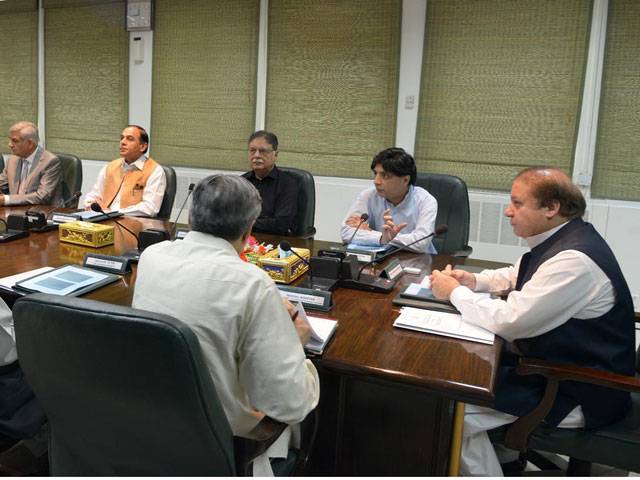ISLAMABAD
SIKANDER SHAHEEN
The military command had conveyed to the ruling brass that any let up in violence was not possible unless the terrorism was dealt with an ‘iron hand’, recommending military action in the militancy infected areas, according to informed insiders.
During the detailed briefings given to the Prime Minister Nawaz Sharif following the latter’s visit to the Inter Services Intelligence (ISI) headquarters on Thursday, the military leadership had explained in depth to the premier regarding the difficulties being faced by Pakistan Army and its paramilitary and intelligence wings in course of their drive against terrorism and insurgency, it is learnt.
Reportedly, during their respective presentations given to the PM, the army generals had referred to certain instances to point out the involvement of some incumbent and former government functionaries including provincial ministers in Balochistan and Khyber Pakhtunkhwa who were allegedly instrumental in hampering the security forces operations using political clout. The PM, according to security sources, was also briefed about the difficulties being faced in arresting and detaining the terror suspects owing to the sympathies and support for them from the local political influential in the two provinces.
Chief of Army Staff (COAS) General Ashfaq Parvez Kayani, ISI Director General Lt-Gen Zaheerul Islam Abbasi, ISI Deputy DG Major General Sahibzada Asfandyar Patodi, ISI Counter-terrorism Operations DG Major-Gen Naveed Mukhtar, Security DG Major-Gen Sajjad Rasul, Counterintelligence DG Major-Gen Nasir Dilawar Shah and ISI sector commanders Major-Gen Naveed Ahmed (Sindh), Major-Gen Raja Aftab (Punjab), Major-Gen Tayab Azam (Khyber Pakhtunkhwa) and Major-Gen Iftikhar Amir (Balochistan) had given briefings and presentations to the PM and his team.
The ruling brass was also informed about the lacunae in the legal system and weaknesses in the prosecution system that prevented the terrorists from being held accountable. In this regard, cases of dozens of arrests of the terror suspects were cited whereby the accused were released due to lack of evidence. These arrests were reportedly made from Quetta, Peshawar, frontier regions and tribal agencies of Federally Administered Tribal Areas, Khyber Pakhtunkhwa and Balochistan.
Requesting anonymity, a government functionary quoted PM Nawaz Sharif as having remarked after receiving the military officers’ briefings that the security lapses in Quetta, Peshawar, Karachi or elsewhere were not justified on any pretext while adding that the military’s recommendations would be incorporated in the government’s strategic and defence policy to forge an effective mechanism against terrorism. Nawaz Sharif is also said to have observed that the matter would be taken up with the political parties in the All Parties Conference (APC) on security, hoping that consensus would be developed for devising a workable line of action against terrorism. The premier instructed the ISI and Military Intelligence to improve coordination with the Intelligence Bureau and other civilian security and intelligence agencies to eradicate terrorism on priority basis, particularly from Quetta, where Shia community was repeatedly targeted, the source said.
The PM Secretariat Spokesman and Information Minister Senator Pervaiz Rashid said that military’s input on the terrorism would be discussed with the political parties. Without confirming whether the same would be taken up in the APC, he said that the government was open to discuss “all options at every platform” for the eradication of terrorism. “We welcome suggestions, recommendations and discussions in order to chalk out an effective policy to weed out terrorism,” he told The Nation. A collective policy acceptable to all the stakeholders – including government, political parties and people of Pakistan – would be formulated to bring an end to violence, he added.
The minister, however, did not elaborate on the details or specifications of the military’s reported recommendations made to the PM, saying that civilian-military cooperation against terrorism would help defeat this menace. “Military is a vital component of the government, dealing with the security-related matters. In order to improve security and bring peace here, it is important that the civilian and military institutions, the civil society, the political parties and the people of Pakistan stand hand in hand against militancy.”
Apparently, the PM’s visit to the headquarters of the military’s premier spy agency followed by detailed background briefings comes as a reflection of the government’s gradually toughening stance against the terrorists after the failed attempts to make them reconcile. In Thursday’s interaction, the COAS had reportedly briefed the PM about army’s defence plan while the DG ISI had presented an overview of the ISI operations both externally and internally.
Friday, April 26, 2024
Army wants to swing ‘iron hand’ at terrorists

8:38 PM | April 25, 2024
8:36 PM | April 25, 2024
Vloggers Shiraz, Muskan cross 2m followers on Instagram
12:27 AM | April 26, 2024
Achakzai stresses collective wisdom to address country's crises
12:27 AM | April 26, 2024
IHC puts off cipher case hearing until April 30
12:26 AM | April 26, 2024
Nawaz Sharif convenes PML-N Punjab meeting tomorrow
12:25 AM | April 26, 2024
ECP reinstates PTI-backed MNA from NA-81 Gujranwala
12:24 AM | April 26, 2024
Academic Uprising
April 24, 2024
Cooperation Momentum
April 24, 2024
Facing Reality
April 24, 2024
Absent Academia
April 23, 2024
Murree’s Redemption
April 23, 2024
Ending animal suffering
April 25, 2024
AI governance
April 25, 2024
AI concerns
April 25, 2024
Population paradox
April 24, 2024
Unveiling differences
April 24, 2024
ePaper - Nawaiwaqt
Advertisement
Nawaiwaqt Group | Copyright © 2024





